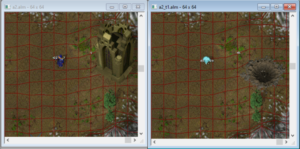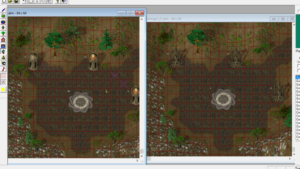 Characters start the game with 0 experience… If it is too difficult for you on the first map, try to buy some healing scrolls in the shop; they are cheap, only 50 coins, but will significantly increase your survivability…
Characters start the game with 0 experience… If it is too difficult for you on the first map, try to buy some healing scrolls in the shop; they are cheap, only 50 coins, but will significantly increase your survivability…- Level 5 succubusses have different resistances than their lower level variants.
- Added special shop at #2: it sells iron weapons. You can find it at Road to Plagat map. The prices in this shop are tricky.. eg Iron Sword price listed as 600 gold, but in reality it is 60.000.
- You almost do not lose experience on the first map, but at advanced difficulties you will loose more;
- Bags with free loot no longer spawn on maps. But on the other hand, you can now “craft” leather armor by killing a squirrel or a wolf!
- Leather armor has increased protection at server #1/2, although this is not written in the description of a particular item (check your character sheet);
- The chance of losing things on death on the first map is extremely small; at other difficulties it 8% for items you wear and 66% for inventory.
- Each difficulty level on the server is balanced separately – the effect of each spell, the parameters of the mob, etc – on different difficulties can differ significantly;
- There was a rumor that the best magic shop on medium difficulty is on Judas;
- The speed of the game on the first three servers difficulties is higher than on the subsequent ones;
- The healing spell affects other characters only if you stay right near them (close range);
- The duration of the spell “Magic Shield” is reduced on high tier servers;
- Powerful combat magic is available on difficulties starting from “Hard”. Before that, players cannot use magic such as invisibility, teleport, blizzard, and so on.
- The top quest in tavern (for which the maximum amount of experience is given at a given difficulty level) does not necessarily give the best reward; sometimes you will get best items not for the most hardest quests;
- If there are 8+ mobs of a the same type on the map, then now you can take a quest for 5-25 pcs. For those who like to hunt a lot of squirrels;
- necromancers, dragons, ogres, trolls, demons and succubus became immune to the astral; this means they are not affected by the magic of vampirism from weapons;
- ogres, trolls and demons are immune to shooting;
- dragons can be scratched with a lance… to do this, change weapons during the attack;
- at high levels of difficulty, antidote-treatment potions can not be found in monsters, but at the same time they still work there…
- Max. bonus from equipment to the astral: +2;
- The Blizzard spell now belongs to the elements of the earth;
- Server #8 quest T1: fireball spell got bonus to damage;
- On server # 7 experience bonus +50%;
- On server # 8 dragon.4 got more magic potency;
- On the maps, you can sometimes find references to the singleplayer campaign of Rage of Mages 1-2. For example, maybe you recognize this place from “Rage of Mage II” – then and now
Or this passage from “Rage of Mages I”:
- If you need to go afk during the game, do not do it while you are in the inn. While you are in the tavern, other players cannot take on new quests (they are not updated). Better to do it in the shop – as shops are independent to each player.
- Be careful in `Middle` map there is a quest in elves’ tavern which summon succubus. It show wrong tip (like it succubus 1 lvl), but actually it’s has much more dangerous summon…
- At low level maps some low level flying units – bats, succubuses, dragons – do not yield experience (to prevent them from appearing in tavern rewards).
- Wall of Stone cost at #6 server 50m, while on #7+ is 150m (HC heroes might be interested..)

